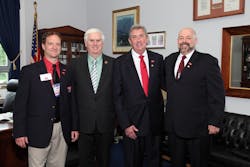PHCC — National Association steps up to the plate on Capitol Hill
WASHINGTON — Fittingly, Building America was the theme of this year’s Plumbing Heating Cooling Contractors — National Association’s Legislative Conference, May 22-23. With more than 140 PHCC members visiting senators and representatives on Capitol Hill to discuss their concerns about the Affordable Care Act and EPA’s efforts to expand the Lead Paint Rule to commercial buildings, the conference was a success — members voiced their concerns regarding these two issues — plus PHCC’s reception at the Capitol the evening of May 22 was the largest in its history, with 16 members of Congress attending and speaking.
“It is very important to continue lobbying for our issues in this industry,” said David Dugger, president of the Plumbing-Heating-Cooling Contractors — National Association and president, CEO of ShoffnerKalthoff Mechanical Electrical Service, Knoxville, Tenn. “The saying has always been either be at the table sitting or be eaten. The majority of congressmen and senators need the support and communication with their constituents over issues and not from some lobbying group that has other goals and agendas. As for the issues we presented — the lead paint rule and health care reform — I do believe that it was well received by all of the aides and or senators and the representatives. I believe that they would rather hear firsthand from business people from their respective areas on the true effects of legislation.
“I can’t say enough about the strong legislative arm that we have within PHCC,” added Dugger. “Our director of government relations, Mark Riso, does a fabulous job and our members step to the plate to support this industry.”
Affordable Care Act
Regarding the Affordable Care Act (ACA), which was passed by Congress in 2010, Dugger is concerned about the effect it will have on businesses.
“The primary requirement affecting us [ShoffnerKalthoff Mechanical Electrical Service] is the mandate to offer affordable health insurance to employees or face penalties,” said Dugger. “There are other aspects of this massive bill that also apply to companies of our size. Because this is all so complex, we’re trying to stay on top of all that is involved, so that we are prepared for all stages of implementation. It’s not an easy process, as the regulations are totally new and often confusing.
“The bill is so complex with so many underlying regulations that I am truly concerned about the effect it will have on my company and my employees,” added Dugger. “In business you have to plan for tomorrow and be proactive and not reactive. With the new health care reform I’m afraid we are all going to be reactive, which is not good business.”
When meeting with senators and representatives, PHCC members discussed the uncertainty ACA is creating for them, the rising cost of premiums and job loss.
Dugger believes the majority of PHCC members, regardless of their company size, are experiencing the same uncertainty his company is facing regarding the health care legislation. “As any business owner knows, it’s difficult to run a company when you can’t anticipate upcoming costs. That’s a formula for bad business,” said Dugger.
According to Mark Giebelhaus, president of Marlin Mechanical Corporation, Phoenix, Ariz., upon his company’s insurance renewal as of May 1 this year, rates went up 23%.
“Our agent is advising us that because of Obamacare our rates will go up between 80% to 140% next renewal,” said Giebelhaus. “How do we price our product when we don’t know what our costs will be? Will we even be able to continue to provide health coverage for our employees? Will we be better off paying the penalty for not providing it and force the employees to the Exchange?”
According to Rick Thompson, service manager of the controls division at Shoffner Mechanical Services, no one truly understands the effects that this reform will have.
“One of the known specifics that we already see is a rise in insurance premiums,” said Thompson. “The uncertainty along with understanding the complexities and what will it take to comply are the major concerns. It is believed that this health care reform will have a huge impact on our personal and professional lives as much if not more than any legislation in the past.”
Brian McDonald, general manager, Outer Banks Heating and Cooling, Kill Devil Hills, N.C., does not think anyone understands all the ramifications of the ACA.
‘I think most are as confused and uncertain as we are about it,” said McDonald. “How can we budget for something that we don’t know a cost for? Do we have to raise prices 1% or 10% to make up for the additional cost? No one has been able to tell us with 100% certainty how or even if it will affect us.”
John Hicks, president of Griffin Heating and Air Conditioning Inc., Statesville, N.C., said that all the North Carolina representatives and senators, along with their aides, seemed sympathetic to members’ concerns.
“They assured us that nothing is set in stone, so our fears of 50% rate increases to small businesses is premature,” said Hicks. “Interestingly, just a few days ago, Congress shouted in outrage that their own health insurance was going to be affected dramatically and that they were afraid that many ‘important’ members of Congress would leave if something wasn't done. It sounds to me like they passed a bill they didn't understand.”
Since the ACA is such a complex and sweeping piece of legislation, PHCC has offered several seminars and webinars on health care reform. The association is also including updates in its regular newsletters and website.
Lead Paint Rule
Currently PHCC is representing members’ interests during the EPA’s current public comment period to determine whether renovation, repair, and painting activities in public and commercial buildings create lead-based paint hazards. A public meeting on this topic was held on June 26, 2013.
PHCC requests that expansion of the rule is based on sound science and that the EPA must work with industry partners.
“Although PHCC does not agree with all aspects of extending the lead paint rule to commercial and public buildings, we do realize it is going to happen. It is part of a lawsuit settlement and EPA will enforce it when the rule goes into effect,” said Dugger.
“As the rule is being finalized, we’re partnering with EPA to make sure the final regulation is based on sound science —data, numbers, research, facts,” added Dugger. “We want the regulators involved to engage with us so we can solve any problems together and develop rules for fair and realistic compliance. We think we can offer a lot to help with this process through the technical knowledge of our members, as well as their hands-on experiences on commercial and public building projects.”
Thompson pointed out that since lead-based paint is still used in commercial and industrial buildings today, the commercial rule would apply to every commercial building regardless of when it was built.
“The EPA should perform studies on the exposure to adults during renovation activities in pre-1978 commercial buildings, before proposing the rule being extended to commercial and industrial buildings,” said Thompson.
Overall, Thompson thinks the meetings with senators, representatives and aids were a success.
“When we get to voice our concerns and/or appreciation on issues that can affect our industry, either positively or negatively, this legislative conference is the perfect time to do so,” explained Thompson. “I believe that our aides, senators and representatives are listening and are receptive. They start the meeting off with a friendly “good to see you again” because they remember us from last year. They seem to care about us as individuals, supporters and continuants, and most of all small business owners. They are concerned about how the Lead Paint Rule and health care reform can directly impact small businesses.
About the Author
Candace Roulo
Candace Roulo, senior editor of CONTRACTOR and graduate of Michigan State University’s College of Communication Arts & Sciences, has 15 years of industry experience in the media and construction industries. She covers a variety of mechanical contracting topics, from sustainable construction practices and policy issues affecting contractors to continuing education for industry professionals and the best business practices that contractors can implement to run successful businesses.



